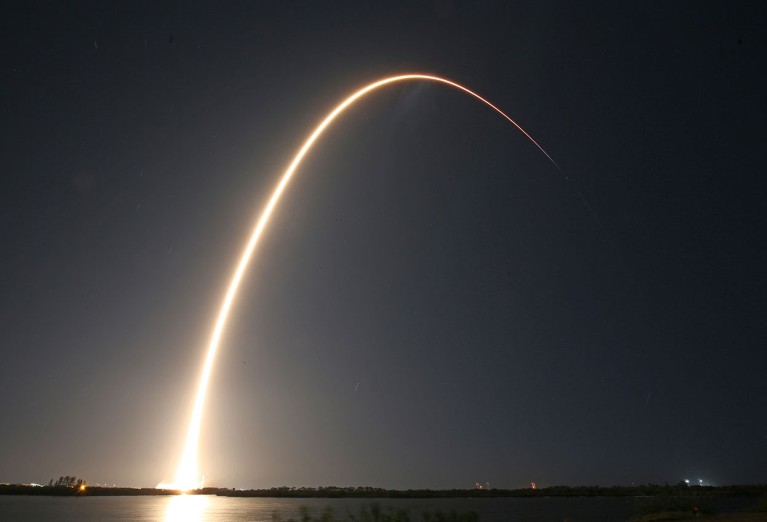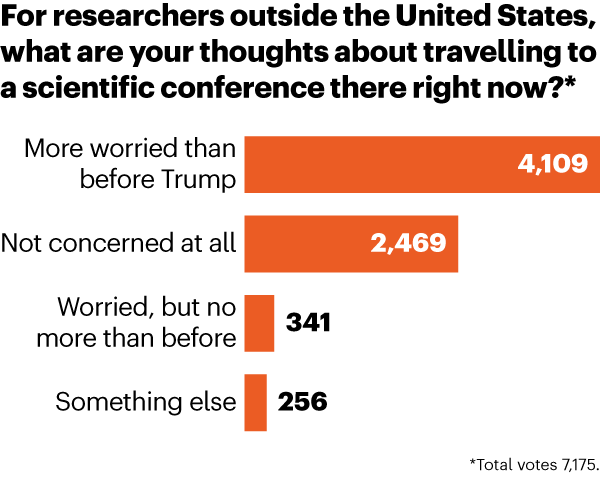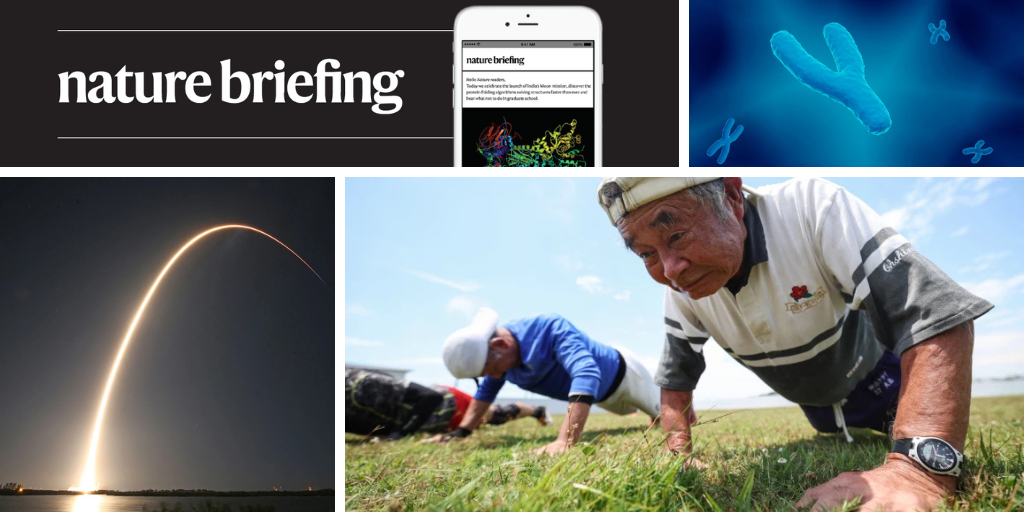You have full access to this article via your institution.
Hello Nature readers, would you like to get this Briefing in your inbox free every day? Sign up here.

A SpaceX Falcon 9 rocket transported the M2 lunar lander into space.Credit: Gregg Newton/AFP via Getty
The HAKUTO-R Mission 2 (M2) lander has probably crash landed on the Moon — the second failed landing attempt by Japanese private space firm ispace. The lander was due to land near the centre of the Moon’s Mare Frigoris in the early hours of yesterday morning. The ispace team lost contact with the craft when it was 192 metres above the Moon’s surface and descending faster than expected. An attempt to reboot M2 was also unsuccessful. ispace’s last attempt, M1, probably crashed during a landing attempt in April 2023.
A mutation in which cancer cells lose their Y chromosome seems to spread ‘contagiously’ from a tumour to immune cells, which dampens their cancer-fighting prowess. These findings could explain why cancers missing the Y chromosome are deadlier than those that retain it. An analysis of data from a massive repository of cancer-cell genomes also revealed that the extent of Y-chromosome loss in both cancer and immune cells could help to predict how quickly a person’s cancer will progress.
Taurine — a common ingredient in energy drinks — might not be as closely linked to ageing as previous research has suggested. A study in 2023 suggested levels of the amino acid declined in people, mice and rhesus monkeys as they aged. A new study found that isn’t so. In fact, in all groups they studied, except male mice, natural taurine levels increased with age. “Taurine levels were not decreasing [with age] and are not related to any abnormality that they could see in this very good longitudinal study,” says geneticist Nir Barzilai.
Question of the week
Travel to the US worries Briefing readers
Recently, Nature reported that some conferences set to take place in the United States have been postponed, cancelled or moved elsewhere in response to fears about crossing the US border. We asked Briefing readers outside the US to tell us how they felt about travelling to a scientific conference there now. (This non-scientific poll happened before US president Donald Trump’s travel ban affecting people from more than a dozen countries and the announcement that his administration will revoke the visas of Chinese students.)
More than half of those who responded said they’d be more worried about travelling to the US now than before Trump became president. Around a third said they wouldn’t be concerned at all. (The Briefing assumes unassailable honesty, and we didn’t verify that people’s locations were genuinely outside the US.)
Most readers who got in touch by e-mail said that they wouldn’t travel to the US for any reason; not just out of concern for themselves, but to demonstrate disapproval of the Trump administration’s policies. A large proportion of replies came from readers in Canada, who expressed particular aversion because of Trump’s threats to their country’s sovereignty.
Some readers reminded us that, for researchers from certain countries, a visit to the US was out of reach long before Trump. They told us about careers hobbled by the “bureaucratic purgatory” of visa approvals that come too late, or not at all. “Now, when I receive invitations to US-based conferences, I quietly decline,” writes one refugee scientist now working in France. “I no longer apply. I no longer dream. And that’s the most devastating loss: not the flight or the stage, but the slow erosion of scientific hope — the idea that if you work hard, publish well, and play fair, the doors of opportunity will open.”

Features & opinion
Two former colleagues’ paths cross unexpectedly in the latest short story for Nature’s Futures series.
Andrew Robinson’s pick of the top five science books to read this week includes a spotlight on the unsung heroes of the human body — muscles — and a window into ancient Mesopotamia through seven engraved objects.
Iron deficiency in mice mothers appears to affect the sexual development of their pups. A particular enzyme, which activates a gene that triggers the development of testes, needs iron to function. When their mothers were iron deficient, some mice with XY chromosomes that would typically develop testes were born with ovaries, or a mix of the two types of reproductive glands. “This is one of the first pieces of evidence to show that environmental factors can influence sex determination” in mammals, Nature reporter Rachel Fieldhouse tells the Nature Podcast.
Nature Podcast | 27 min listen
Subscribe to the Nature Podcast on Apple Podcasts, Spotify or YouTube Music, or use the RSS feed.
Today Leif Penguinson is visiting a Black swan (Cygnus atratus) and its cygnets in Kalbarri National Park, Western Australia. Can you find the penguin?
The answer will be in Monday’s e-mail, all thanks to Briefing photo editor and penguin wrangler Tom Houghton.
This newsletter is always evolving — tell us what you think! Please send your feedback to [email protected].
Thanks for reading,
Flora Graham, senior editor, Nature Briefing
With contributions by Jacob Smith
Want more? Sign up to our other free Nature Briefing newsletters:
• Nature Briefing: Careers — insights, advice and award-winning journalism to help you optimize your working life
• Nature Briefing: Microbiology — the most abundant living entities on our planet — microorganisms — and the role they play in health, the environment and food systems
• Nature Briefing: Anthropocene — climate change, biodiversity, sustainability and geoengineering
• Nature Briefing: AI & Robotics — 100% written by humans, of course
• Nature Briefing: Cancer — a weekly newsletter written with cancer researchers in mind
• Nature Briefing: Translational Research — covers biotechnology, drug discovery and pharma


